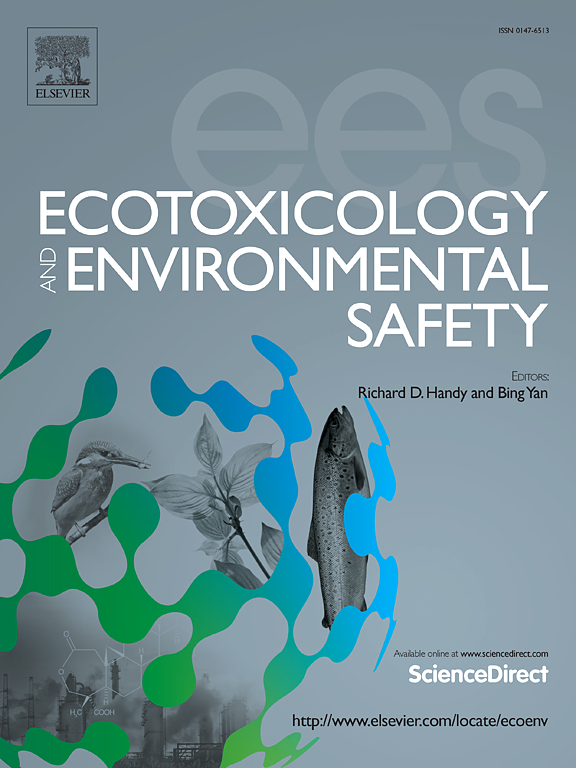Sex-specific analyses of early-life tobacco smoke exposure and later-life irritable bowel syndrome: Sensitive window, mediation pathway, and genetic predisposition
IF 6.1
2区 环境科学与生态学
Q1 ENVIRONMENTAL SCIENCES
引用次数: 0
Abstract
Tobacco smoke can relax colonic smooth muscles and increase intestinal permeability, but whether early-life exposure affects later-life irritable bowel syndrome (IBS) and its underlying pathway remain unknown. We obtained the data from a large-scale cohort study in UK biobank, including information on age of smoking initiation (in utero period, childhood, adolescence, and adulthood), levels of C-reactive protein (CRP), genetic risk score (GRS), and IBS onset. We employed Cox proportional hazards models to examine the association between tobacco smoke exposure at different stages of life and incident IBS, and recognize the sensitive window. We further analyzed the interaction and joint effects of tobacco smoke exposure and GRS on IBS, as well as the mediation of CRP. Participants with initiating exposure to tobacco smoke in utero showed a higher IBS risk with hazard ratio (HR) of 1.149 (95 % CI: 1.093, 1.207), compared to unexposed individuals. Those who started smoking in childhood showed a greater risk with HR of 1.274 (95 % CI: 1.161, 1.399) than never smokers. Dose-response relationship showed the incident IBS increased with the earlier initiation and the longer duration of tobacco smoke. Notably, joint effect of initiating tobacco smoke at different stages presented participants initiating in utero and childhood had the strongest impact on IBS onset, with HR of 1.516 (95 % CI: 1.313, 1.751). The relations of early-life tobacco smoke exposure and IBS differed with genetic susceptibilities, being stronger in individuals with higher GRS. Furthermore, CRP partially mediated the associations of early-life tobacco smoke exposure at different stages of life with the incident IBS, with mediating proportions ranging from 5.73 % to 9.10 %. What’s more, these aforementioned relationships are more pronounced in females than males. Accordingly, early-life tobacco smoke exposure, particularly during utero period and childhood in females, elevated the IBS onset, differing with genetic predisposition and mediated by the inflammation pathway.
早期烟草烟雾暴露与晚年肠易激综合征的性别特异性分析:敏感窗口、中介途径和遗传易感性
烟草烟雾可以放松结肠平滑肌,增加肠道通透性,但幼年接触烟草是否会影响以后的肠易激综合征(IBS)及其潜在途径尚不清楚。我们从英国生物银行(UK biobank)的一项大规模队列研究中获得数据,包括开始吸烟的年龄(子宫期、儿童期、青春期和成年期)、c反应蛋白(CRP)水平、遗传风险评分(GRS)和肠易激综合征发病的信息。我们采用Cox比例风险模型来检验生命不同阶段烟草烟雾暴露与IBS事件之间的关系,并识别敏感窗口。我们进一步分析了烟草烟雾暴露和GRS对IBS的相互作用和联合作用,以及CRP的中介作用。与未接触烟草烟雾的个体相比,在子宫内开始接触烟草烟雾的参与者显示出更高的IBS风险,风险比(HR)为1.149(95 % CI: 1.093, 1.207)。儿童时期开始吸烟的人比从不吸烟者的风险更高,HR为1.274(95 % CI: 1.161, 1.399)。剂量-反应关系表明,IBS的发生率随吸烟时间的延长而增加。值得注意的是,在不同阶段开始吸烟的参与者在子宫和儿童时期开始吸烟对IBS发病的影响最大,HR为1.516(95 % CI: 1.313, 1.751)。早期烟草烟雾暴露与IBS的关系因遗传易感性而异,在高GRS个体中更强。此外,CRP部分介导了生命早期不同阶段的烟草烟雾暴露与IBS事件的关联,介导比例从5.73 %到9.10 %不等。更重要的是,上述这些关系在女性中比男性更明显。因此,早期生活中的烟草烟雾暴露,特别是女性在子宫期和儿童期,会增加肠易激综合征的发病,这与遗传易感性不同,并由炎症途径介导。
本文章由计算机程序翻译,如有差异,请以英文原文为准。
求助全文
约1分钟内获得全文
求助全文
来源期刊
CiteScore
12.10
自引率
5.90%
发文量
1234
审稿时长
88 days
期刊介绍:
Ecotoxicology and Environmental Safety is a multi-disciplinary journal that focuses on understanding the exposure and effects of environmental contamination on organisms including human health. The scope of the journal covers three main themes. The topics within these themes, indicated below, include (but are not limited to) the following: Ecotoxicology、Environmental Chemistry、Environmental Safety etc.

 求助内容:
求助内容: 应助结果提醒方式:
应助结果提醒方式:


